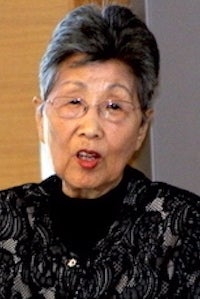- Professor Emerita
- College of Nursing
- Email: suziekim@uri.edu
Biography
Hesook Suzie Kim was a College of Nursing professor from 1973 until her retirement in 2004, and dean of the College from 1983 to 1988. She also was a professor at the University of Oslo in Norway from 1992 to 2003. She has been an international researcher and leader in nursing theory development with an emphasis on the nature of nursing practice.
Dr. Kim is one of the namesakes of the Dr. Donna Schwartz-Barcott and Dr. Hesook Suzie Kim Nursing Fellowship, awarded to doctoral degree candidates at the URI College of Nursing, and intended to address the nationwide shortage in nursing professors by supporting those who aspire to careers as faculty members after completing their degree.
Education
Ph.D., Sociology, Brown University
M.A., Sociology, Brown University
M.S., Nursing Education, Indiana University
B.S., Nursing, Indiana University
Selected Publications
Kim, H. S. (2025 – 2nd Ed. Expected). Assistive technology for people with dementia: ethical considerations. In I. Kollak (ed.), Safe at home with assistive technology (pp. 173-192). Berlin, Germany: Springer.
Kleven, T., Sommer, M., Borg, M., Karlsson, B., Sundet, R., & Kim, H.S. (2023). Toward an experience-based model of recovery and recovery-oriented practice in mental health and substance abuse care: An integration of the findings from a set of meta-syntheses. International Journal of Environmental Research and Public Health, 18, 13180. https://doi.org/10.3390/ijerph20166607
Kleven, T., Sommer, M., Borg, M., Karlsson, B., Sundet, R., & Kim, H.S. (2021). Part III: Recovery-oriented practices in the community mental health and substance abuse services. A meta-synthesis. International Journal of Environmental Research and Public Health, 18, 13180. https://doi.org/10.3390/ijerph182413180
Somers, M., Biong, S., Borg, M., Karlsson, B., Klevan, T., Ness, O., Nesse, L., Oute, J., Sundet, R., & Kim, H.S. (2021). Part II: Living life: A meta-synthesis exploring recovery as processual experiences. International Journal of Environmental Research and Public Health, 18, 6115. https://doi.org/10.33901/ijerph18116115
Kleven, T., Bank, N., Borg, M., Karlsson, B., Krane, V., Ogundipe, E., Semb, K., Sommer, M., Sundet, R., Sælor, K.T., Tonnessen, S.H., & Kim H.S. (2021). Part I: Dynamics of recovery: A meta-synthesis exploring the nature of mental health and substance abuse recovery. International Journal of Environmental Research and Public Health, 18, 7761. https://doi.org/10.33901/ijerph18157761
Sundet, R., Kim, H. S., Karlsson, B.E., Borg, M., Sælor, K.T., & Ness, O. (2020). A heuristic model for collaborative practice – Part 2. Development of the collaobrative dialogue-based clinical practice model for community mental health and substance abuse care. International Journal of Mental Health Systems, (2020). 14:43. https://doi.org/10.1186/s13033-020-00377-4
Kim, H. S. (2015). The essence of nursing practice. New York: Springer Publishing.
Kim, H. S. (2012). Outcomes-based curriculum development and student evaluation in nursing education. Journal of Korean Academy of Nursing, 42, 917-927.
Kim, H. S. (2012). The role of theory in clinical nursing practice. Klinisk Sygepleje, 2012-2, 16-29.
Kim, H. S., Schwartz-Barcott, D., & Holter, I. M. (2012). Cross-cultural use and validity of pain scales & questionnaires – Norwegian case study. In M. Incayawar & K. H. Todd (Eds.). Pain, Culture, Brain, & Analgesia – Understanding and managing pain in diverse populations. New York: Oxford University Press.
Kim, H. S. (2010). The nature of theoretical thinking in nursing. 3rd ed. New York: Springer Publishing.
Kim, H. S. (2009). Theoretical thinking in nursing: Problems and prospects. In P. G. Reed & N. B. Crawford Shearer (Eds.), Perspectives on nursing theory (pp. 38-48). Philadelphia: Lippincott Williams & Wilkins.
Kim, H. S. (2009). An integrative framework for conceptualizing clients: A proposal for a nursing perspective in the new century. In P. G. Reed & N. B. Crawford Shearer (Eds.), Perspectives on nursing theory (pp. 631-637). Philadelphia: Lippincott Williams & Wilkins.
Schwartz-Barcott, D., & Kim, H.S. (2000). An expansion and elaboration of the Hybrid Model of concept development. In B.L. Rodgers & K. A Knafl (Eds.), Concept development in nursing: Foundations, techniques, and applications, 2nd ed. (pp. 129-159). Philadelphia: W. B. Saunders.
Kim, H. S., Ellefsen, B., Han, K. J., & Alves, S. L. (2008). Clinical constructions by nurses in Korea, Norway, and the United States. Western Journal of Nursing Research, 30, 54-72.
Kim, H. S. (2006). Knowledge synthesis and use in practice – debunking “evidence-based”. Klinisk sygepleje, 20 (Nr. 2), 24-34.
Kim, H. S., Sjöström, B., & Schwartz-Barcott, D. (2006). Pain assessment in the perspective of action science. Research & Theory for Nursing Practice, 20(3), 215-228.
Kim, H.S., & Kollak, I. (Eds.). (2005). Nursing theories: Conceptual and philosophical foundations. 2nd Edition. New York: Springer Publishing.
Kim, H. S. (2005). The concept of holism. In H. S. Kim & I. Kollak (Eds.). Nursing theories: Conceptual and philosophical foundations. 2nd Edition (pp. 89-108). New York: Springer Publishing.
Kim, H. S. (2005). Existentialism and phenomenology in nursing theories. In H. S. Kim & I. Kollak (Eds.). Nursing theories: Conceptual and philosophical foundations. 2nd Ed. (pp. 141-156). New York: Springer Publishing.
Kim, H. S., & Sjöström, B. (2005). Pragmatism, nursing, and nursing knowledge development. In H. S. Kim & I. Kollak (Eds.). Nursing theories: Conceptual and philosophical foundations. 2nd Ed. (pp. 184-201). New York: Springer Publishing.

